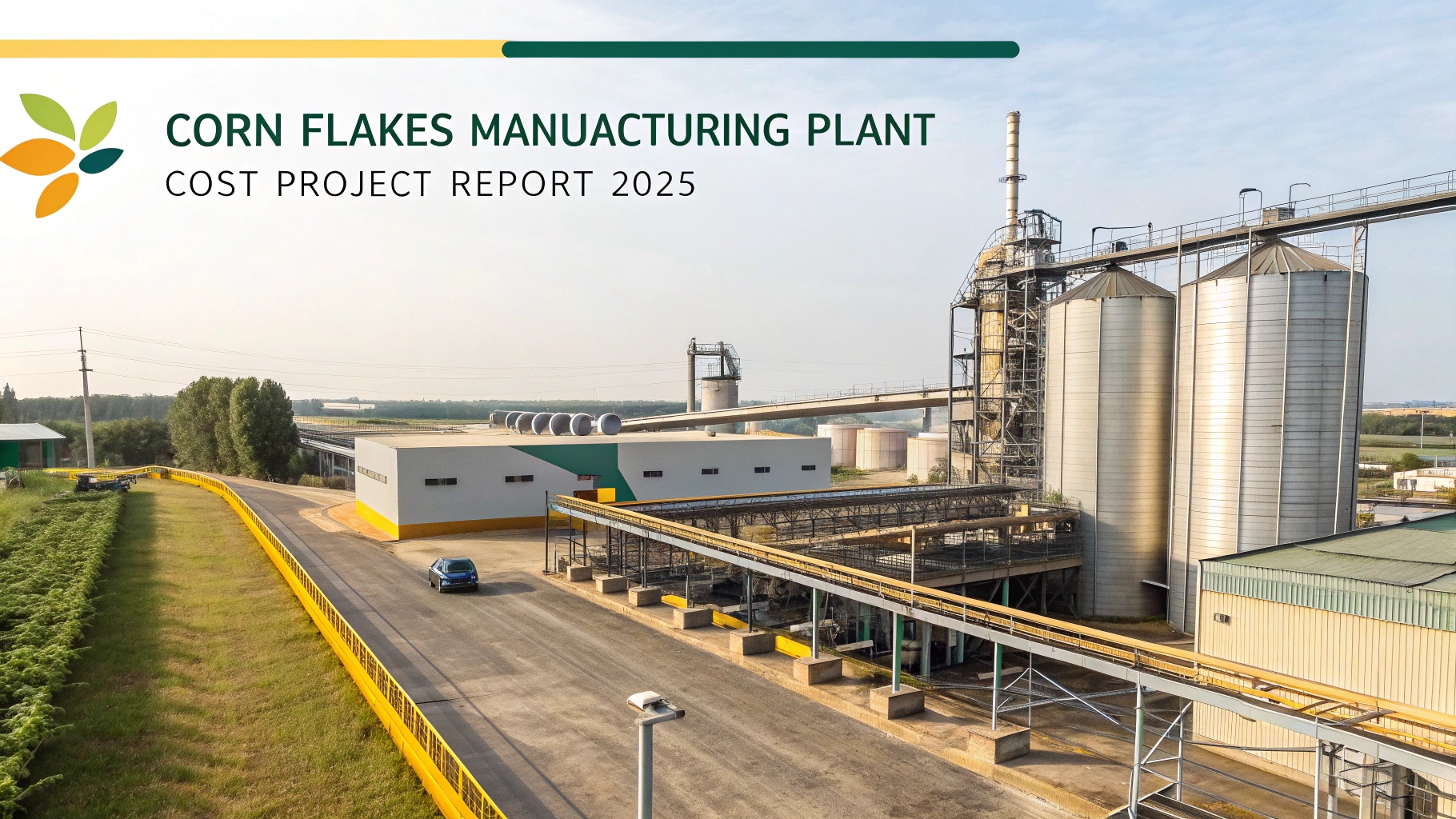Manufacturing Industry Today
Corn Flakes Manufacturing Plant 2025: Project Cost, Raw Materials Requirement and Profit Margin
The corn flakes industry has become one of the fastest-growing segments in the breakfast cereal sector, supported by increasing consumer demand for convenient and nutritious breakfast options across global markets. Setting up a corn flakes manufacturing plant requires more than just infrastructure; it involves strategic planning, investment, efficient equipment, and strong market awareness. This article presents an overview of corn flakes manufacturing plants, covering setup, processing stages, market trends, investment considerations, and operational requirements.
What About Corn Flakes?
Corn flakes hold a significant position in the global breakfast cereal market due to their taste, nutritional value, and convenience in modern lifestyles. They are made from milled corn enriched with vitamins, minerals, and sometimes sugar and malt flavoring, offering a crispy texture and quick meal solution. The product is low in fat, easily digestible, and can be fortified with essential nutrients to meet dietary requirements. The growing popularity of corn flakes in both household consumption and institutional foodservice has driven demand for various product formats including plain, sugar-coated, honey-flavored, and multi-grain varieties. Sustainable sourcing practices and clean label ingredients are becoming increasingly important, as consumers and regulators emphasize natural ingredients, reduced sugar content, and responsibly sourced raw materials.

Request a Sample Report: https://www.imarcgroup.com/corn-flakes-manufacturing-plant-project-report/requestsample
What is Driving the Corn Flakes Market?
The corn flakes market is primarily driven by rising consumer demand for convenient, ready-to-eat breakfast options, alongside increasing health awareness that emphasizes fortified and nutritious morning meals. Global urbanization and busy lifestyles have boosted consumption of quick breakfast solutions, ensuring consistent demand across urban and semi-urban regions. Expanding retail distribution networks and improved product availability through supermarkets and e-commerce platforms have further facilitated wider accessibility. Moreover, the popularity of portion-controlled packs, family-size boxes, and flavored variants is fueling demand in both retail and institutional sectors. Population growth, rising disposable incomes, and changing dietary habits in emerging economies also support market expansion. Sustainability initiatives, non-GMO certifications, and eco-friendly packaging practices are influencing consumer choices, aligning the industry with evolving preferences for wholesome and responsibly produced breakfast cereal products.
Understanding Corn Flakes Manufacturing
- Corn flakes manufacturing refers to converting corn grits through cooking, flavoring, rolling, toasting, and packaging into crispy, ready-to-eat breakfast cereal products.
- Manufacturing activities include cleaning, milling, cooking, flavoring, drying, flaking, toasting, cooling, fortification, and packaging.
- Corn flakes require precise moisture control and temperature management; therefore, strict process control, quality monitoring, and hygiene standards are vital.
- Efficiency in the process ensures consistent texture, compliance with food safety regulations, and extended shelf life for domestic and export markets.
Key Components of a Business Plan
- Executive Summary: Outlines vision, mission, and business objectives.
- Market Research: Identifies demand patterns, consumer behavior, and competitive players.
- Operational Strategy: Includes plant design, capacity, workflow, and quality assurance measures.
- Marketing and Sales Plan: Defines distribution channels, branding, and positioning in domestic and export markets.
- Financial Planning: Covers projected investments, cost structures, and revenue expectations.
- Risk Assessment: Evaluates potential challenges such as raw material supply, regulatory compliance, and market fluctuations.
Capital Investment Overview
CapEx (Capital Expenditure):
- Land acquisition, plant construction, utilities setup, and equipment purchase.
- One-time costs associated with establishing infrastructure and ensuring manufacturing efficiency.
- Defines long-term productivity and competitiveness.
OpEx (Operating Expenditure):
- Recurring costs including labor, utilities, packaging, storage, and transportation.
- Raw material procurement and regular equipment maintenance.
- Compliance with safety certifications, hygiene practices, and quality control standards.
Buy Report Now: https://www.imarcgroup.com/checkout?id=18499&method=1911
Machinery and Equipment Requirements
Primary Equipment:
- Corn milling and grits preparation systems.
- Rotary cookers for steam cooking and flavoring.
- Drying ovens for moisture reduction.
- Flaking rolls for creating thin flakes.
- Toasting ovens for achieving crispness and color.
- Vitamin and mineral fortification systems.
- Automated packaging machines for hygiene and efficiency.
Supporting Equipment:
- Cooling conveyors for temperature reduction.
- Sieves and grading equipment for size sorting.
- Storage silos for raw materials and finished products.
- Quality control laboratory equipment.
Operating Costs
- Procurement of corn grits, sugar, malt, and fortification ingredients.
- Labor salaries, training, and workforce management.
- Utilities such as electricity, steam, water, and fuel.
- Maintenance and servicing of machinery and equipment.
- Packaging materials including boxes, inner pouches, and printed cartons.
- Transportation and distribution logistics.
- Certification, compliance, and quality assurance activities.
Raw Materials
- Main Raw Material: Corn grits or degermed corn of specified quality grades.
- Additional Inputs: Packaging items including cardboard boxes, metallized pouches, and printed wrappers.
- Auxiliary Materials: Sugar, malt extract, salt, vitamins, minerals, and approved food additives.
- Supply Considerations: Consistency of quality, reliable sourcing partnerships, and adherence to sustainability practices including non-GMO corn sourcing.
Ask Analyst for Customized Report: https://www.imarcgroup.com/request?type=report&id=18499&flag=C
Frequently Asked Questions (FAQs)
- What is the first step in setting up a corn flakes manufacturing plant? The process begins with developing a business plan, securing land, obtaining food safety licenses and certifications, and identifying reliable raw material suppliers.
- Why is moisture control considered critical? Moisture control ensures proper texture, crispness, prevents spoilage, and helps achieve the desired shelf life for domestic and international markets.
- Can corn flakes manufacturing plants focus only on domestic markets? Yes, though many plants also target exports, as international markets often demand high-quality breakfast cereals with specific fortification and packaging requirements.
- How does automation benefit corn flakes manufacturing? Automation improves production speed, reduces contamination risks, lowers dependency on manual labor, and enhances product consistency and packaging quality.
- Is product diversification necessary? Not mandatory; many manufacturers start with basic corn flakes and gradually expand to flavored variants, multi-grain options, and premium product lines based on market demand.
Browse Related Reports:
Ixazomib Production Plant Cost: https://www.florevit.com/read-blog/58085
Nursing Training School Business Plan: https://occ.orioncode.sg/read-blog/53130
Spa Business Plan: https://www.dancechanneltv.com/news/why-entrepreneurs-should-consider-spa-business-in-2025
Petitgrain Oil Processing Plant Cost: https://theprome.com/read-blog/45485
About Us:
IMARC Group is a global management consulting firm that helps the world's most ambitious changemakers to create a lasting impact. The company excels in understanding its client's business priorities and delivering tailored solutions that drive meaningful outcomes. We provide a comprehensive suite of market entry and expansion services. Our offerings include thorough market assessment, feasibility studies, company incorporation assistance, factory setup support, regulatory approvals and licensing navigation, branding, marketing and sales strategies, competitive landscape, and benchmarking analyses, pricing and cost research, and procurement research.
Contact Us:
IMARC Group
134 N 4th St. Brooklyn, NY 11249, USA
Email: sales@imarcgroup.com
Tel No:(D) +91 120 433 0800
United States: (+1-201971-6302)
Share on Social Media



Other Industry News
Ready to start publishing
Sign Up today!








